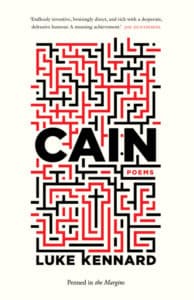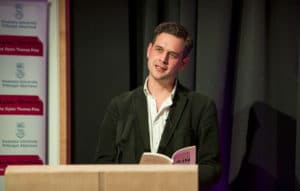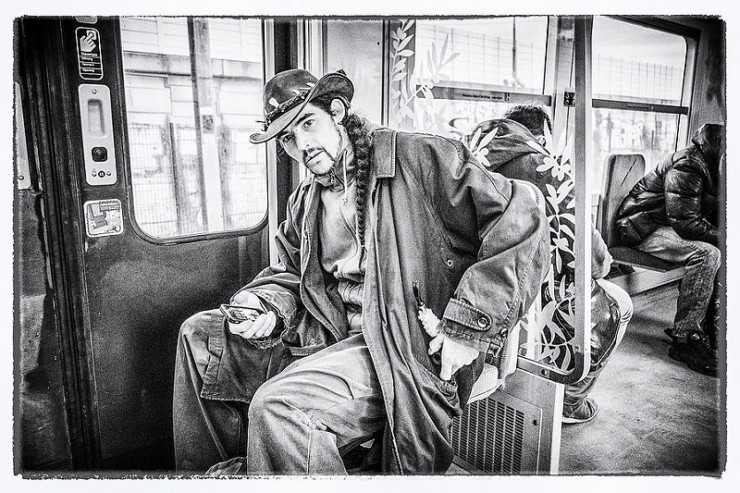British poet Luke Kennard has collected a number of glowing descriptions of his poetry—among them ingenious, innovative, clever, entertaining, “one of British poetry’s brightest lights,” and funny. After reading Cain: Poems, his latest collection, I would add “playful” and “a dash of mischief.”
The Cain of the title is the Cain of the book of Genesis in the Bible, the man who killed his brother Abel because he was jealous of the favor shown by God to Abel’s offering. God didn’t smite Cain down for his crime, but he did put a mark upon him and sent him into permanent exile and wandering. The biblical account doesn’t mention what the mark was, but it must have been noticeable.
In Kennard’s poems, Cain shows up one day at the poet’s front door. The poet has lost his faith and his marriage in the same week, and turned to the solace of beer—a lot of beer, wine-strength wheat beers, in fact. The poet hears the doorbell ring, and there’s an inflatable life-sized Frankenstein doll, behind which stands Cain. (I can’t imagine that the inflatable Frankenstein is Cain’s mark, but it does raise some interesting possibilities.)
Cain becomes the poet’s companion. More than that, he becomes the poet’s counselor, tour guide, psychoanalyst, and conscience (of a sort). They visit an old people’s home where Cain volunteers. They talk about trees. Cain encourages the poet to talk to women. He takes the poet to a shrine but they arrive in the wrong century. They visit a glass eye museum. And gradually does the reader see that Cain is actually part of the poet, suggesting that the poet also bears the mark of Cain (and so, perhaps, do the rest us).
The poems are often funny, and definitely playful, but there’s also a poignancy to them. Among other things, Cain represents loss—the loss of innocence, of rootedness and place, and of belonging.
Intermezzo Zolpimist

if I can find the right combination
of caffeine, alcohol and misfortune.
The auto-reject is held in another tab.
Someone tricked you into taking
yourself seriously. I don’t feel this ever
passing: my friend is a nurse and she says
it doesn’t ever pass and I trust her.
I watch the cogs from the motorway bridge,
and help is a publicity stunt
and talking about it is cold water.
Stepping into the river in my best shoes,
I think that’s apt and then I feel sick.
Back at the glass eye museum, Cain
takes my hand. ‘You’re as bad as science,’
he says. ‘I wish the philosophers
would get involved again.’
Cain is divided into three parts: the Cain poems; a series of anagrams whose presentation on the page is challenging—black-printed text in the center surrounded by smaller red-printed text; and then a section entitled “Death Shroud” that returns to Cain. The anagrams in the middle, however, stay true to the theme of the Cain poems.

Luke Kennard
Kennard teaches English and creative writing at the University of Birmingham. He has published several collections, including The Solex Brothers (Redux) (2005); The Migraine Hotel (2009); The Harbour Beyond the Movie (2010); Planet-Shaped Horse (2013); and A Lost Expression (2014). He has also published a sci-fi mystery, Holophin (2012), and will be publishing a novel, The Transition, in January of 2018.
I’m not sure what I would do if my doorbell rang and I opened the door to find a life-sized Frankenstein doll and the person of Cain. But Kennard evidently did, and in Cain produced a funny, thought-provoking account.
Related:
Luke Kennard reads “Cain Reverses Time”
Photo by Roberto Borello, Creative Commons, via Flickr. Post by Glynn Young, author of the novels Dancing Priest and A Light Shining, and Poetry at Work.
__________________________

“I require all our incoming poetry students—in the MFA I direct—to buy and read this book.”
—Jeanetta Calhoun Mish
- Longfellow’s “Paul Revere’s Ride”: Creating a National Legend - April 17, 2025
- Poets and Poems: Katie Kalisz and “Flu Season” - April 15, 2025
- Poets and Poems: Michelle Ortega and “When You Ask Me, Why Paris?” - April 10, 2025

Bethany R. says
Love the image of answering the door to an inflatable Frankenstein in front of Cain! Glad to learn about this thoughtful poet with a sense of humor. Thanks for this post.